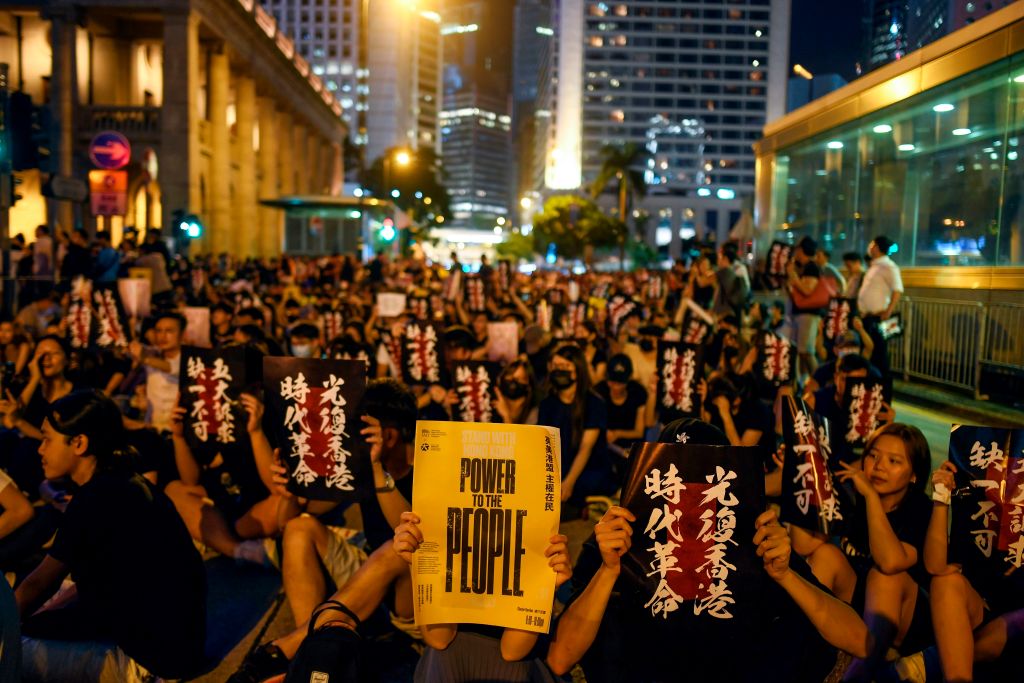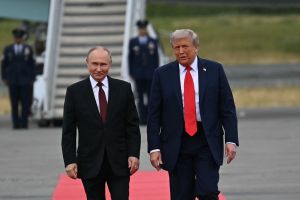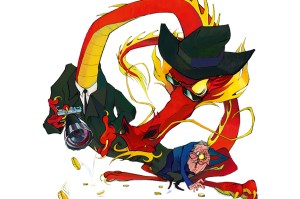The central question regarding the Hong Kong protests is not whether a crackdown is imminent — it’s already happening — but its final form.
After more than 60 days of unrest in Hong Kong, Chinese leader Xi Jinping seeks to bring the city under control as quickly as possible, and without using the military. Rather than repeat the 1989 Tiananmen Square Massacre, Xi wants the repression to occur through aggressive law enforcement and severe punishment, while not yielding an inch to the protesters’ demands.
Chinese state propaganda has ominously escalated its rhetoric. The protests are now labeled a ‘color revolution’, and their violence as ‘terrorism’. Meanwhile an anti-riot drill, code-named ‘Sword Drawing,’ and deployment of hundreds of China’s riot police, the People’s Armed Police Force (PAP), is occurring across the border in nearby Shenzhen. With armored vehicles and water cannon massing, all signs suggest that Beijing is poised to strike, and end the Hong Kong protests — but without falling into the Tiananmen trap.
Beijing must suppress the Hong Kong protesters without sparking a severe international and domestic response. Beijing believes that its biggest problem is that the Hong Kong police are hopelessly ineffective and, in some cases, sympathetic to the protesters. Beijing has launched a campaign to augment the police, and has urged them to be more aggressive in order to ‘enforce the law and not fear the threats of those mobs’. But it’s not working.
Beijing’s best option is to shore up its puppet government in Hong Kong, give Carrie Lam full support, and let her get the situation under control. In our view, Beijing does not need to resort to using military power. It still has several options to suppress the protests, all of them legal. For example, chief executive Carrie Lam can ban all protests. Under Article 17(E) of the Public Order Ordinance, anyone who takes part or organizes in protests can be jailed for up to three years. Lam can also ban or impose curfew through executive orders of Article 48(4) of the Basic Law.
A second option would be for China to declare a state of emergency in Hong Kong. Article 18 of the Basic Law allows China to do so during ‘turmoil within the Hong Kong Special Administrative Region which endangers national unity or security and is beyond the control of the government of the Region’. Beijing could then apply Chinese laws and legal procedures, severely punishing those it deems to be rioters, terrorists and traitors — really, anyone it dislikes. The PRC will use this opportunity as Hitler used the Night of the Long Knives in 1934, to settle old scores and to eliminate actual and imagined enemies. China can extend that state of emergency for as long as required.
Chinese Dream Times, a YouTube channel set up by China’s propaganda machine, has posted a video naming Hong Kongers such as Joshua Wong and Professor Benny Tai as bad elements. The video advocates putting ‘bullets in some of their heads and let them go to hell, and jailing ‘others for life and let them wear through the prison floor’. This horrific and alarming vision is likely to occur when Chinese law applies to Hong Kong, because Chinese law is nothing but a tool for the regime to suppress dissent. Surprisingly, YouTube permits such hate speech and violent propaganda.
Thirdly, Beijing could announce the abolishment of Hong Kong’s ‘high degree of autonomy’ status, as India has done to Kashmir, and take away Hong Kong’s executive, legislative and judicial independence. But Beijing may be wary of this option, because as a consequence Hong Kong would lose its free port status and other lucrative privileges. This would directly impact Beijing’s money laundry, intelligence, and banned technology procurement operations.
Not using military force against Hong Kongers doesn’t mean non-violence. Whichever option China takes, we believe the crackdown will be bloody. China’s one million armed police may be as dangerous as the People’s Liberation Army. They have trained since 1989 and Tiananmen Square, and know precisely how to crush protesters. We suspect that Chinese police have already penetrated Hong Kong, disguised as Hong Kong police officers, to suppress the protesters.
Without the international community’s firm support, a bloody crackdown on Hong Kong is inevitable. American policy-makers must acknowledge Hong Kong’s strategic value — its geopolitical significance in the advancement of human rights and democracy in Asia, in competition against the Chinese communist regime — and take substantial measures to help Hong Kong.
President Trump should issue a statement openly calling upon the Chinese regime to refrain from declaring a state of emergency, and from sending China’s armed police or regular police into Hong Kong.
Additionally, President Trump should call for an immediate process of peaceful resolution through dialogue and discussion between the Chinese central government, and Hong Kong’s government, its Civil Human Rights Front, its pan-democracy camp, and its legislators and representatives from other sectors.
The most powerful measure the US can take is to deny Hong Kong’s access to the US financial market, including imposing sanctions on the purchase or acquisition of US dollar banknotes by the Government of Hong Kong.
Another measure the US may implement is imposing visa sanctions or full Magnitsky Act sanctions against Hong Kong officials and Chinese Communist party officials suspected of responsibility for human rights abuses, including Carrie Lam, Hong Kong police commissioner Junius Kwan-yiu Ho (who is also a member of the legislature), and Li Jiyi (minister of new territories of the CCP-Hong Kong Liaison Office). Both Ho and Li were behind the recent violence in Yuanlang, and are likely to be the faces of further repression.
Lastly, in anticipation of a bloody crackdown, the US should prepare contingency plans through Executive Orders or special legislation, and offer sanctuary to Hong Kong activists, who now face severe punishment, as well as providing a safe haven for Hong Kong’s capital, assets, and other investments.

























